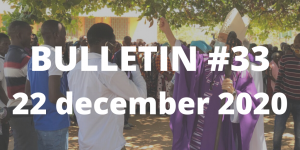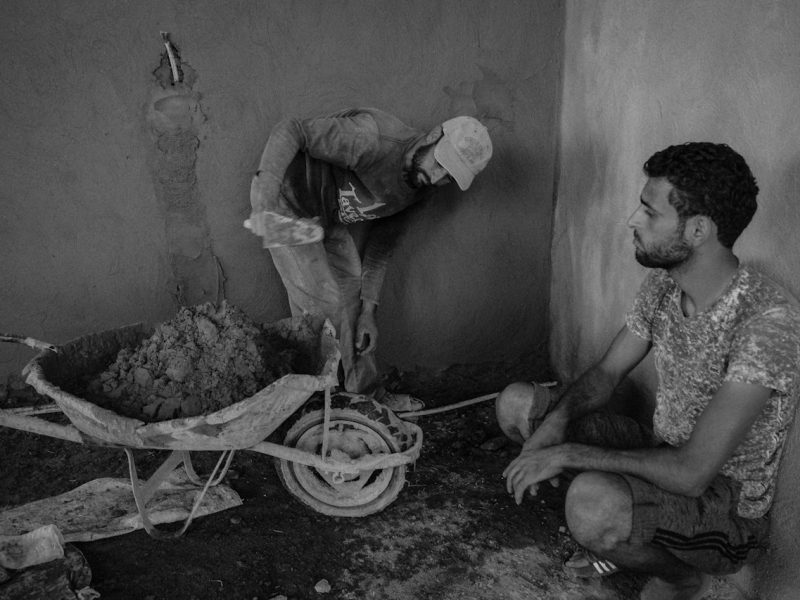

COVID-19 | BULLETIN #33 | 22 December 2020
“May the Lord restore our sight, so as to rediscover what it means
to be members of the human family” (Pope Francis)
Assisting forcibly displaced people
For the past eleven years, two brutal conflicts have deeply scarred populations in the border regions between Cameroon and Nigeria (IT; FR; ES), killing innocent people, compelling children to drop out of school, and forcing many families to leave their homes.
In the north: due to attacks by Boko Haram, people from northeastern Nigeria move daily into Cameroon’s north region, where many Cameroonians are themselves forcibly displaced, too. Minawao Camp, built on the Cameroon side in 2015 to receive Nigerian refugees, now also shelters Cameroonian IDPs. The Diocese of Maïduguri (Nigeria) has built a chapel in the camp where both Bishop Oliver Doeme of Maïduguri and Bishop Bruno Ateba of Maroua-Mokolo Diocese (where the camp is located) serve displaced persons. The two pastors ensure that people in the camp are welcomed, enjoy food security, and receive means of subsistence, healthcare, drinking water, sanitation, and schooling for their children.
In the south: in the other direction, two Nigerian Catholic dioceses – the Archdiocese of Calabar, in Cross River State, and the Diocese of Makurdi, in Benue State – are responding to the needs of refugees from Cameroon’s anglophone southwestern region. Nigerian and Cameroonian dioceses, with the help of the Archdiocese of Calabar’s Justice Development Peace Commission (JDPC), the Catholic Caritas Foundation Nigeria, and the Foundation for the Development of Justice and Peace, provide refugees with food, clean water, and mosquito nets. Other humanitarian relief includes clothing, small sums of money, sanitation facilities, healthcare, and shelter kits. According to Fr. Emmanuel Bekomson, Director of JDPC, humanitarian support must include spiritual and pastoral care, and he appealed for help to build a centre where newly arrived refugees would be housed as they await processing.
These cross-border efforts in both directions are an edifying example, indeed ideal, of pastoral cooperation!
The situation in northern Mozambique is deteriorating day by day: attacks have continued in Cabo Delgado province, causing the population of its capital, Pemba, to double. The Community of Sant’Egidio has been helping these internally displaced people (PT; IT; ES; FR). On 15 November — the World Day of the Poor — food, soap, and masks were distributed to about 150 families who had reached Pemba by boat. The Community of Sant’Egidio of Nampula visited 350 displaced families who were relocated to Corrane, to bring friendship, support, and practical assistance. Meanwhile, thanks to a donation by Pope Francis (PT; IT; ES; FR) to the diocese of Pemba, two centres are to be created to provide health care for people fleeing the war. “With his gesture of charity, Pope Francis is providing us with 100,000 euros to help the displaced”, said Mgr. Lisboa, who explained that the decision to build the two health centres was taken after consulting those responsible for assistance to the displaced. There are also several Catholic agencies in Portugal, such as Caritas Portuguesa (PT), AIS foundation (PT), and the Archdiocese of Braga (PT), that are conducting campaigns to collect help for IDPs in Pemba.
With the outbreak of the coronavirus pandemic, the situation of the people of South Sudan — whose circumstances are already desperate due to a war that has lasted almost seven years — has worsened further due to confinement and insufficient food and water. Salesian missionaries continue to be at the side of the displaced population (ES), offering them material help but also spiritual accompaniment. The objective of the programme is to provide support to IDPs in Tonj and the western state of Bahr-el-Ghazal, who were left homeless and had to take refuge in the woods where they were unprotected and lacked the basic necessities. The Salesians have offered food, water, sanitation, and medicine to more than 3,500 internally displaced persons. During these months, radio programmes were also developed to explain the measures needed to prevent transmission of COVID-19. This initiative is in addition to the distribution of preventive goods and medicines. Meanwhile masses of South Sudanese returnees (IT; ES; FR) have arrived in Tombura-Yambio counties. They are without any humanitarian support. Fr. Albert Salvans of the Missionary Community of St. Paul the Apostle, faced with the dramatic needs of the two parishes of which he is the administrator (Ave Maria Catholic and St. Thomas), distributes basic necessities collected in the parishes.
Responding to the need for self-reliance
All people have the equal right to work, to share their talents, and to earn a living. On one hand, the spread of the coronavirus has emphasized social inequalities and made the weakest even more vulnerable; and on the other, has highlighted the important role of displaced people in our economy and society. Different Catholic actors are committed to providing opportunities for the most vulnerable to fulfil their own potential and to contribute to society.
The Jesuit Refugee Service (JRS) works to provide refugees with opportunities to fulfil their potential and contribute to society. For this purpose, they launched Pathfinder (ES; FR), a career support programme for refugees. By providing professional and vocational training, start-up support, career counselling, and entrepreneurial guidance, JRS seeks to create pathways to self-reliance for refugees so they can become agents of positive change and social transformation. The Pathfinder approach comprises three steps preceded by a preparation phase, to assess both the refugee and host-community contexts. Step 1 consists in matching job-market needs with the skills and professional aspirations of refugees. Step 2 aims at training refugees in specific skills. Step 3, finally, focuses on links with potential employers for internships, CV writing, preparation for job interviews, etc. Refugees have their dignity and hope reaffirmed when they acquire the means to earn their own living and support their families. In addition, more durable and sustainable solutions can enhance refugee self-reliance and ease the pressure on host countries.
In Bangladesh, 7,500 ethnic people, mostly Garo people, have lost their jobs and about 116 entrepreneurs have closed their businesses during the pandemic. The Garo, who had been both workers and owners, had to return to their villages to eke out whatever living they could. Caritas Bangladesh organized a gathering to encourage dozens of young indigenous entrepreneurs still reeling from the effects of the lockdown. Their stalls featured traditional and locally-made items including food, clothes, bags, and ornaments, as well as services such as event management, wedding programs, and beauty parlors. Some 50 young entrepreneurs displayed their products and services during the two-day Young Entrepreneurs Gathering 2020 in the city of Mymensingh.
“Open Doors”, a non-profit organization that supports Christians persecuted in more than 60 countries because of their faith, launched a “centre of hope” in Iraq (IT) to allow Christian families, who fled in 2014 following the arrival of the Islamic State, to return to their homes in Mosul and the nearby town of Alqosh. The Centres of Hope are buildings attached to local churches. Besides working to rebuild houses by providing funds and labour, they strengthen the Christian community through practical help, socio-economic development projects, and schools; and they encourage spiritual reinvigoration through Bible studies and activities for children and young people. This project was launched shortly before Pope Francis’s call (IT) to the international community to help foster peace in Syria and Iraq and help Christians remain. “We must ensure that the presence of Christians in these lands continues to be what it has always been — a sign of peace, progress, development and reconciliation between individuals and peoples.” Lastly, the Pope offered encouragement to all the Catholic aid agencies that are involved in humanitarian efforts and that help migrants and displaced persons no matter their faith or origin.
Addressing the Council of the International Organization for Migration in Geneva on 26 November 2020, Archbishop Ivan Jurkovič described migrants as essential workers amid the pandemic. “It is regrettable that, while migrants’ labour is in high demand and welcomed to compensate for labour shortages, they also are often rejected and subjected to resentful, utilitarian attitudes by many in receiving societies,” he affirmed. Jurkovič, the Permanent Observer of the Holy See to the United Nations, said that this sad reality is a “glaring contradiction that stems from placing economic interests over the interests of the human person.” If we want migrants to make a meaningful contribution to our societies, cultures, and economy, we need to offer them the chance for successful integration. Indeed, “what is certain is that migration will be playing an ever-increasing role in our societies. Therefore, now is the time to rethink the parameters of human coexistence through the lenses of human fraternity and solidarity,” Jurkovič noted.
Fratelli tutti: a journey towards common fraternity
“All in the same boat: Nurturing Resilience in a Global Community” (ES) is the title of a speech delivered by Cardinal Michael Czerny, Undersecretary of the Migrants and Refugees Section of the Dicastery for Promoting Integral Human Development, during the “Nurturing Resilience” webinar organized by the Lay Centre in Rome. In this pandemic context, Cardinal Czerny stressed, all lives are more precarious. We are all in the same boat. Life on this boat is precarious because, instead of behaving like brothers, we attack each other and also attack our natural environment. This is why Pope Francis works so arduously in Laudato si’ and Fratelli tutti to reverse the penchant for conflict and invites us to proceed decisively towards something new, something that can lead us to increased resilience for our communities. To achieve this goal, the Cardinal noted, it is necessary to pursue the common good. This requires forgiveness and overcoming the various conflicts that, although inevitable, should never lead to violence, but to dialogue and finally to reconciliation. In a society in which we prefer division and enmity, he concludes, Fratelli tutti is an urgent call to social friendship and fraternity. Who will take the first step? The answer is “Religions at the service of fraternity in our world,” as the title of chapter 8 evocatively suggests. “From our faith experience and from the wisdom accumulated over centuries, but also from lessons learned from our many weaknesses and failures, we, the believers of the different religions, know that our witness to God benefits our societies [and] helps us recognize one another as travelling companions, truly brothers and sisters”.
Andrea Ricciardi, founder of the Community of Sant’Egidio, analyzes Fratelli tutti on his blog (IT) and finds in it a proposal to rebuild the world, healing its misery and its broken or non-existent social relationships, and repairing the exploitation of the Earth that creates a poisoned heritage for future generations. The Pope’s proposal is to join with others “to weave a new way of making history”. This calls for a new economy, one that does not produce misery for the many and wealth for only a few. According to the Pope, what is needed is “promoting and encouraging models of development, progress and sustainability in which people, especially the excluded (including our sister earth), will no longer be – at most – a merely nominal, technical or functional presence. Instead, they will become protagonists.” The process that Francis initiated with his encyclical represents a new approach to fraternity. “Fraternity, born of the realization that we are a single human family, must penetrate the life of peoples, communities, government leaders and international assemblies. This will help everyone to understand that we can only be saved together, through encounter and negotiation, setting aside our conflicts and pursuing reconciliation.” For Ricciardi, this is the only alternative to a world where inequalities are stark and violence erupts, where the Earth is impoverished, where millions of people end up in poverty.
Download the bulletin n°33:
For earlier issues of this Bulletin, please visit migrants-refugees.va/c-19-bulletin
We invite you to share this newsletter freely and widely. Please send news to us of the initiatives and good practices you are involved in, so that we can pass on good examples which inspire hope in future newsletters.
If you would like this Bulletin sent directly to your e-mail address, please send a brief request to: media@migrants-refugees.org





